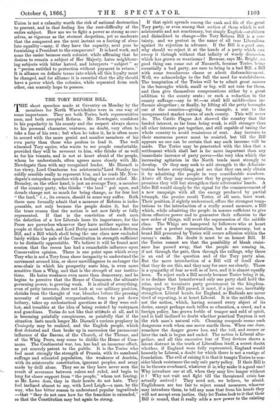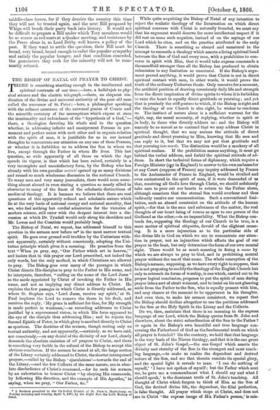THE TORY REFORM BILL.
THE short speeches made at Coventry on Monday by the members for North Warwickshire were in one way of some importance. They are both Tories, both representative men, and both accepted Reform. Mr. Newdegate, confident in his popularity in his county and the respect always shown to his personal character, ventures, no doubt, very often to take a line of his own ; but when he takes it, he is often more in accord with the more genial and manlier members of his own party than those who profess to lead it. The well educated Tory squire, who wants to see people comfortable, provided they will be reverent to him, who thinks of as well as for his tenants, and is not at heart afraid of the people, whom he understands, often agrees more closely with Mr. Newdegate than with any recognized leader. Mr. Disraeli is too yiewy, Lord Cranborne too aristocratic,'Lord Stanley too coldly sensible really to represent him, and he reads Mr. New- degate's outspoken speeches with a feeling of secret relief. Mr. Bromley, on the other hand, is just an average Tory, a member of the country party, who thinks " the land " put upon, and dreads change not so much for being change, as for fear lest " the land," i. e., its owners, should in some way suffer. Both these men formally admit that a measure of Reform is indis- pensable, not only because the people desire it, but for the truer reason that the nation is not now fairly or fully represented. If that is the conviction of such men the defection of a few Liberals loses its importance, for the Peers are powerless whenever they have neither squires nor people at their back, and Lord Derby must introduce a Reform Bill, and a Bill which shall bring the one class now excluded fairly within the pale of the Constitution in strength sufficient to be distinctly appreciable. We belie■M' it will be found next session that the recess has had a remarkable influence upon Conservative opinion. There is one point upon which every Tory who is not a Tory from sheer incapacity to understand the movement around him, or sheer unwillingness to endanger the arm-chair in which his prosperity seats him, is even more sensitive than a Whig, and that is the strength of our institu- tions. He hates weakness even more than democracy, and he begins to perceive that the House of Commons, the ultimate governing power, is growing weak. It is afraid of everything, even of petty interests, dare not look at our military position, shrinks from the thought of war, blenches before the pressing necessity of municipal reorganization, fears to put down bribery, takes up ecclesiastical questions as if they were red- hot, and trembles at the idea of being resisted by vestrymen and guardians. Tories do not like that attitude at all, and it is becoming painfully conspicuous, so painfully that if the situation lasts much, longer Mr. Disraeli's curious prophecy in Coningsby may be realized, and the English people, which first detested and then broke up in succession the paramount influence of the Barons, of the Church of the Throne, and of the Whig Peers, may come to dislike the House of Com- mons. The Continental war, too, has had an immense effect, as yet scarcely patent to the public. It is the Tories who feel most strongly the strength of Prussia, with its manhood suffrage and educated population, the weakness of Austria, with its aristocratic constitution, ignorant peoples, and army made by drill alone. They see as they have never seen the result of severance between rulers and ruled, and begin to long for closer support from "the people," whom not fearing, as Mr. Lowe does, they in their hearts do not hate. They feel inclined almost to say, with Lord Leigh—a man, by the way, who has bitter reason to understand popular ingratitude —that " they do not care how far the franchise is extended," so that the Constitution may but again be strong. If that spirit spreads among the rank and file of the great Tory party, or even among that section of them which is not aristocratic and not reactionary, but simply English—stubborn and disinclined to change—the Tory Reform Bill is a cer- tainty, and we protest in the, name of all true Liberalism against its rejection in advance. If the Bill is a good one why should we reject it at the hands of a party which can sweep it thrbugh without that infinity of wordy discussion which has grown so wearisome ? Because, says Mr. Bright, no good thing can come out of Nazareth, because Tories, being essentially a bad party, are sure to bring in a bad Bill, a Bill with some treacherous clause or adroit disfranchisement. Well, we acknowledge to the full the need for watchfulness. The temptation of the Tories will be to admit great masses in the boroughs which, small or big, will not vote for them, and then give themselves compensations either by a great addition to the county seats ; or such a reduction in the county suffrage—say to 8l.—as shall kill middle-class in- fluence altogether ; or finally, by lifting all the petty boroughs out of the counties—giving, for example, a seat to the unrepresented market towns of each county. This will never do. The Cattle Plague Act showed the country that the landed interest, so far from being weak, is still stronger than all other interests put together, and still capable of taxing the whole country to avoid remissions of rent. Any increase to their enormous power must be resisted, but till the Bill appears no one can be certain that any such increase will be made. The Tories may be penetrated with the idea that a settlement which shall last is far more important than any immediate increase of party power—the very idea which the increasing agitation in the North tends most strongly to develop. Or they may seek to add strength to the Adminis- tration before everything, and see that they can only obtain it by admitting the people in very considerable numbars. Above all they may recognize that by proposing mere com- promises they will but strengthen their adversaries' hands. A false Bill would simply be the signal for the commencement of - a new campaign with all the energy produced by partial triumph, the precise result Tories, of all men, least want. Their position, if rightly understood, offers the strongest temp- tations to the introduction of a really sound measure, a Bill which, while admitting the people in masses sufficient to give them effective power and to guarantee their adhesion to the new order of things, will avert the supersession of the middle class. The Whigs are hampered by followers who at heart desire not a perfect representation, but a democracy, but a broad Bill presented by Tories will secure adhesion within the enemy's ranks. No doubt it must be an honest Bill. If. the Tories cannot see that the possibility of blank resist- ance has passed away, that the people are coming in, if not through the gate, then through the railings, why there is an end of the question and of the Tory party also But the mere introduction of a Bill will of itself show that they do see this, and they may for once see clearly. There is a sympathy of fear as well as of love, and it is almost equally keen. To reject such a Bill merely because Tories bring it in, is to declare that henceforward only one party shall hold the reins, and so terminate party government in the kingdom. Supposing a Tory Bill passed, it must, if a just one, inevitably strengthen Liberal hands, for England, as Radicals are never tired of repeating, is at heart Liberal. It is the middle class, not the nation, which, having secured every object of its desire, except perhaps such trifles as education, a creed, and a foreign policy, has grown feeble of temper and cold of spirit, and is half inclined to doubt whether practical Toryism is not the rich man's natural rule. Cleaning cesspools seems such dangerous work when one never smells them. When one does, somehow the danger grows less, and the toil, and sooner or later the task is begun and ended. The nation is Liberal alto- gether, and all this excessive fear of Tory devices shows a latent distrust in the truth of Liberalism itself, a secret doubt whether, if England were fully represented, England would honestly be Liberal, a doubt for which there is not a vestige of foundation. The evil of raising it is that it tempts Tories to con- sider blank resistance the only safe party policy. If their Bill is to be thrown overboard, whatever it is, why make it a good one? Why introduce one at all, when they may live longer without it ? Why not wait and fight till the threatened crisis has actually arrived ? They need not, we believe, be afraid. Englishmen are too fair to reject sound measures, whoever may introduce them, to tell any man that from his hands they will not accept even justice. Only let Tories look to it that their Bill is sound, that it really adds a new power to the existing
middle-class forces, for if they deceive the country this time they will not be trusted again, and the next Bill proposed by Whigs will brush their party back into history. It would not be difficult to prepare a Bill under which Tory members would be as scarce as red coats at a Quaker meeting, and resistance by the Peers alone is, as Lord Deiby well knows, a policy of the past. If they want to settle the question, their Bill must be broad, very broad, broad enough to enlist the popular sympathy and satisfy the popular hunger, and that condition conceded, the guarantees they seek for the minority will not be sum- marily refused.































 Previous page
Previous page